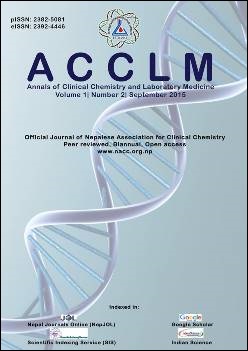Prevalence of Metabolic Syndrome in Patients with Diabetes Mellitus Type 2 Attending Tribhuwan University Teaching Hospital
DOI:
https://doi.org/10.3126/acclm.v1i2.12961Abstract
BACKGROUND: Metabolic syndrome (Met S) is a cluster of biochemical and physical conditions that presage the development of atherosclerotic cardiovascular disease. Its association with diabetes mellitus has long been a topic of study. This study intends to find out the prevalence of Met S in Nepalese population using IDF criteria.
METHODS: This cross-sectional study was carried out in department of medicine and department of biochemistry, Tribhuwan University teaching hospital, Maharajgunj, Kathmandu. 204 diabetic subjects, with age ranging between 31 to 80 years and similar number of healthy controls were recruited for study. Demographic, anthopometric and biochemical data were obtained as per preformed profoma. Statistical analysis was done using SPSS statistical software version 17.0.
RESULTS: Prevalence of metabolic syndrome in diabetic population was found to be 67.3%, while it was only 7.84% in control group. Prevalence was found to be higher in females compared to males.
CONCLUSIONS: Prevalence of metabolic syndrome is significantly higher in diabetic subjects, making them highly prone to the ill effects of cardiovascular diseases.
Downloads
Downloads
Published
How to Cite
Issue
Section
License
Authors who publish with this journal agree to the following terms:
- The author transfers copyright to the Nepalese Association for Clinical Chemistry.
- The journal publishes the work under a Creative Commons Attribution License that allows others to share the work with an acknowledgement of the work's authorship and initial publication in this journal and under the same share-alike license used here.
- Authors are able to enter into separate, additional contractual arrangements for the non-exclusive distribution of the journal's published version of the work (e.g., post it to an institutional repository or publish it in a book), with an acknowledgement of its initial publication in this journal.
- Authors are permitted and encouraged to post their work online (e.g., in institutional repositories or on their website) prior to and during the submission process, as it can lead to productive exchanges, as well as earlier and greater citation of published work (See The Effect of Open Access).




